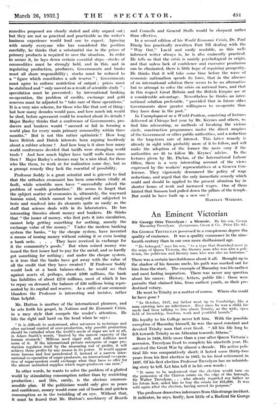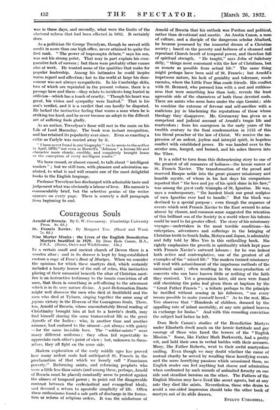An Eminent Victorian
Sir George Otto Trevelyan : a Memoir. By 1141 son, George Macaulay Tmvelyan. (Longman, Omen & Co. Price 12s. ed.) SIR GEORGE TREVELYAN possessed in a conspicuous degree the quality of eminence. It was a quality commoner in the nine- teenth century than in our own more disillusioned age.
" He belonged," says his son, " to a type that flourished most in the reign of Queen Victoria, the literary man who was also a poli• tician, the politician and literary man who was also an historian."
There was a certain inevitableness about it all. Brought up in the shadow of his famous uncle, his path was marked out for him from the start. The example of Macaulay was his earliest and most lasting inspiration. There was never any question about his career. History, letters, public life : these were pursuits that claimed him, from earliest youth, as their pre- destined votary.
He went to Trinity as a matter of course. Vtliere else could he have gone ?
" In October, 1857, my father went up to Cambridge, like a man entering into an inheritance. Ever since he was a child, his uncle had been talking to him about Trinity, as the wide; open field of friendship, freedom, work and youthful laurels."
His loyalty to his College never left him. With the possible exception of Macaulay himself, he was the most constant and devoted Trinity man that ever lived. " All his life long he felt towards Trinity as an Athenian towards Athens."
Born in 1838, little more than a year after Queen Victoria's accession, Trevelyan lived to complete his ninetieth year. Ile survived the Great War by almost a decade. Ills active poli- tical life was comparatively short; it lasted some thirty-two years from his first election in 180.5, to his final retirement in 1897. Of his first election Professor Trevelyan has an astonish- ing story to tell. Let him tell it in his own words : " It came to be understood that the election would turn on the possession of the Chirton estate on the edge of the borough, Sir Walter Trevelyan, . . . who already regarded my father as his future heir, aided him to buy tho estate for £01,000. It was sold again after the election, having served its purpose."
The professor draws two inferences from thisstrange incident. It indicates, he says, firstly, how little of a Radical Sir George
was in those days, and secondly, what were the limits of the electoral reform that had been effected in 1832. It certainly does.
As a politician Sir George Trevelyan, though he served with credit in more than one high office, never attained to quite the first rank. " The power of impromptu debate," says his son, was not his strong point. That may in part explain his com- parative lack of success ; but there were probably other causes also at work. He wanted some of the qualities that make for popular leadership. Among his intimates he could inspire warns regard and affection ; but to the world at large his dem- eanour was not always sympathetic. In his Cambridge skits, two of which are reprinted in the present volume, there is a passage here and there—they relate to incidents long buried in oblivion—which has a touch of cruelty. "Though his heart was great, his vision and sympathy were limited." That is his son's verdict, and it is a verdict that can hardly be disputed. He lacked the instinctive feeling that warns a man when he is striking too hard, and he never became an adept in the difficult art of suffering fools gladly.
As an author, Trevelyan's fame will rest in the main on his Life of Lord Macaulay. The book won instant recognition, and has retained its popularity ever since. Even so exacting a critic as Carlyle was carried away by it.
" I have never found in any biography " (so he wrote to the author in April, 1876)"not even in Boswell's 'Johnson' a human life and diameter more clearly, credibly, and completely brought home to the conception of every intelligent reader."
We have ceased, or almost ceased, to talk about " intelligent readers " ; but we still turn, with pleasure and admiration un- abated, to what is and will remain one of the most delightful books in the English language.
Professor Trevelyan has discharged with admirable taste and judgement what was obviously a labour of love. His memoir is commendably brief, but the selective genius of the writer appears on every page. There is scarcely a dull paragraph from beginning to end.



































 Previous page
Previous page